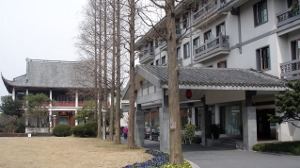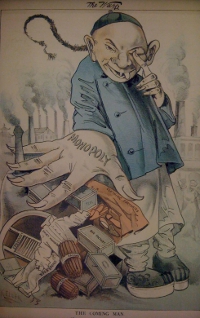|
||||||||||
|
ARTICLESThe Harmonious Evolution of Information in ChinaGeremie R. BarméThese reflections on Internet freedom were first published on 29 January 2010 by China Beat. A Polish version was printed in „Gazeta Swiateczna”, the Saturday edition of „Gazeta Wyborcza” in February 2010. It may of be interest for the reader to note that the author is also the co-designer and main writer of two websites that are blocked in China: www.tsquare.tv and www.morningsun.org. My thanks to the editors of China Beat for permission to reproduce this essay here.  Fig.1 Column base, Cathedral Church of Saint John the Devine, Manhattan. (Photograph: GRB, February 2010) As the contretemps involving Google’s conflicted presence in the People’s Republic of China unfolds, it is timely to recall one anniversary that passed by all but unnoticed in 2009: that of a covert Cold War-era clash between John Foster Dulles and Mao Zedong in 1959. This overlooked anniversary is worth recalling now, since it is of particular relevance to contextualizing the remarks—and the Chinese response to those remarks—that US Secretary of State Hillary Clinton made regarding Internet freedom and US policy at the Newseum in Washington on 21 January 2010 (see here). In that speech Clinton reminds her audience of comments that President Barack Obama made on Internet freedom during the webcast section of his November ‘town hall meeting’ in Shanghai. As Clinton said: ‘In response to a question that was sent in over the Internet, he [Obama] defended the right of people to freely access information, and said that the more freely information flows, the stronger societies become. He spoke about how access to information helps citizens to hold their governments accountable, generates new ideas, and encourages creativity. The United States' belief in that truth is what brings me here today.’ In her speech the Secretary of State also referred to the First Amendment of the US Constitution, as well as to Franklin Roosevelt’s support for the Four Freedoms in 1941 (that is, freedom of expression, freedom of worship, freedom from want and freedom from fear), and Eleanor Roosevelt’s efforts to have those freedoms enshrined in the Universal Declaration of Human Rights years later following the end of WWII. Something Clinton did not mention, however, was the policy advice of another Secretary of State given in the crucial years after the war and during the opening salvos of the Cold War. That Secretary of State is John Foster Dulles, and his strategy related to ‘peaceful evolution’ would have quickly figured in the thinking of Chinese political figures and strategists as they pored over Clinton’s January 2010 remarks. Dulles first articulated a US policy in support of the peaceful evolution of socialist countries into polities more acceptable and in tune with the western democracies in 1953; he further elaborated it in 1958 and again in ’59. Dulles formulated this policy as a way of encouraging a peaceful transition within those disparate societies away from violent authoritarian, one-party control in favour of political and social pluralism, not to mention the market economy. Among other things, Dulles argued that support for nascent forms of opposition within socialist countries, cultural subversion and the spread of information were all important in the ideological Cold War.  Fig.2 Dahua Hotel by the West Lake in Hangzhou, where Mao Zedong warned agains 'peaceful evolution' in December 1959. (Photograph: GRB, March 2009) In China, as he became more concerned with the future of the revolution, the political backsliding of the Soviet Union and the question of ‘revolutionary successors’, Mao Zedong formulated a response to Dulles. He outlined his views at a small Party gathering convened at what is now the Dahua Hotel (Dahua fandian 大华饭店) in Hangzhou in November 1959. The Party elder Bo Yibo 薄一波 quotes from Mao’s Hangzhou speech in his fascinating memoir (published in two volumes in 1991 and ’93 respectively): Dulles said that justice and law should replace violence and that war should be abandoned, and law and justice should be emphasized. Dulles also argued that the abandonment of force under the circumstances did not mean the ‘maintenance of the status quo’, but meant a peaceful ‘change.’ (laughter) Change whom peacefully? Dulles wants to change countries like ours. He wants to subvert and change us to follow his ideas.... Therefore, the United States is attempting to carry out its aggression and expansion with a much more deceptive tactic.... In other words, it wants to keep its order and change our system. It wants to corrupt us by a peaceful evolution. In the following months and years, Mao frequently mentioned the dangers of peaceful evolution (heping yanbian 和平演变 in Chinese), and the looming threat of revisionism in China. This double threat, and his own concerns about the limited semi-market policy reforms of his colleagues, as well as anxiety over the successors to his revolutionary cause, contributed to his thinking on what would become the Cultural Revolution. As I have noted elsewhere, since the initiation of the Reform era some three decades ago, the Chinese Communist Party's policy on peaceful evolution has effectively been evacuated of its earlier pro-socialist and radical revolutionary ideological content. What remains is a theoretical justification sanctioned originally by Mao Zedong and later Deng Xiaoping for a nationalism (or ‘Chinese particularism’) wedded to authoritarian one-party politics. It would be unwise to forget that Deng and his colleagues were quick to blame the United States and other countries for politically manipulating the 1989 Protest Movement, for attempting to use civil unrest in China to turn the country into a ‘bourgeois vassaldom’ (zibenzhuyi guojia fushuguo 资本主义国家附属国) of the West, or a ‘totally Western-dependent bourgeois republic’. This ‘plot’ aimed at encouraging China to peacefully evolve into a democracy dependent on international capital was seen as a continuation of a struggle in which China's Communist Party had been engaged since the late 1950s. (See my editorial introduction to Qiang Zhai, ‘1959: Preventing Peaceful Evolution’, China Heritage Quarterly, Issue 18, June 2009.)  Fig.3 Gramercy Park, Manhattan. (Photograph: Lois Conner, March 2010) One could argue that the fundamental national-ideological, nay philosophical difference between China’s Party-state (or Party-empire, to use Chu Anping’s powerful term from the 1950s—see ‘China’s Promise’ also in Articles in this issue), and that of liberal democracies has changed relatively little since Mao enunciated the anti-peaceful evolution line in 1959. While the present leaders might not read many controversial accounts of Chinese history, there is no doubt that through the influential Zhongnanhai Lecture Series (Zhongnanhai jiangzuo 中南海讲座, invited lectures by specialists in various fields) and the reading of memoirs by party elders such as Bo Yibo (Politburo member Bo Xilai’s 薄熙来 father) present (and future) leaders learn and revisit the struggles of the nascent Party-state in the 1950s. Strategist and advisers of my acquaintance sometimes also revisit the works and strategies of Mao Zedong when formulating their own advice.  Fig.4 Image from the Museum of Chinese in America (MOCA), Chinatown, Manhattan. (Photograph: GRB, February 2010) Hillary Clinton’s recent speech on freedom of information and the Internet is a clear enunciation of the long-term rhetorical and ideological divide between various authoritarian states and the liberal democracies. One such state, China, was in 1959 in the grip of a new phase of ideological and nationalistic fervour that would play out with tragic consequences in the 1960s and ’70s. Again, in 1989, the old Maoist strategic response to US policies espousing various basic freedoms served both a familiar, and a new purpose. The effect since—carefully honed patriotic education, the increasingly sophisticated use of the semi-independent media, the guided commentariat on TV and radio—have melded together both as a result of careful planning and sheer happenstance to form a continued response to ‘Western’ efforts and hopes to see China evolve into a more pluralistic society. Since 2005, the Hu-Wen leadership of the Communist Party has pursued a policy underpinned by a strategy to create and maintain a ‘harmonious society.’ It is a kind of harmony that is policed with overt rigour. So much is ‘harmonized’ (bei hexie diao 被和谐掉) in the process of creating a quiescent socio-economic environment in which authoritarianism and plutocracy hold sway, that ‘to harmonise’ (bei hexie 被和谐) has become a common verb in colloquial Chinese meaning ‘to censor’, ‘elide’ or ‘expunge.’ Under the Party China eschews the old strategy of peaceful evolution and its recent upgrades in favour of a kind of what I would call ‘harmonious evolution’ (hexie yanbian 和谐演变). In her January speech Hillary Clinton added a new freedom to Roosevelt’s 1941 list of four: the freedom to connect, or as she put it, ‘The freedom to connect is like the freedom of assembly in cyber space.’ She announced that the US government is ‘supporting the development of new tools that enable citizens to exercise their right of free expression by circumventing politically motivated censorship.’ She also identified the crucial importance of information flows, noting in particular that, ‘Historically, asymmetrical access to information is one of the leading causes of interstate conflict. When we face serious disputes or dangerous incidents, it's critical that people on both sides of the problem have access to the same set of facts and opinions.’ Clinton concluded that, ‘By advancing this agenda, we align our principles, our economic goals, and our strategic priorities. We need to create a world in which access to networks and information brings people closer together, and expands our definition of community.’ Such assertions, along with clearly articulated and appropriately funded strategies, to undermine autocracy through new media and via the agency of connected communities with free and equal access to information make some mainland commentators suggest that the Chinese Party-state is wise to maintain its unilateral freedom to pull the plug. Not surprisingly then, the Chinese media was quick to cast Clinton’s 21 January speech as merely the latest expression of US ‘information imperialism’, one that is nothing more than an example of post-colonial hegemonic behaviour. It is careless and unhelpful to dismiss such bloviating as just the usual sensationalist hyperbole and overblown official rhetoric. To my mind, these responses are reflective of something more basic and enduring, and we discount such formulations as mere semantics, or the latest example of Chinese bombast, at our peril.  Fig.5 The Gate of Rectitude (Duan Men 端门), Palace Museum, Beijing. (Photograph: GRB, January 2010)
In 1997, China’s avowed ‘Year of the Internet’, the oral historian Sang Ye and I were invited by the editors of WIRED magazine to conduct an informal survey of the Chinese Internet. The piece, published in the June 1997 issue of the magazine, was titled ‘The Great Firewall of China’—to my knowledge, the first time that expression was used (WIRED, vol.5, no.6). For our study we interviewed the then head of the Internet surveillance authority in Beijing, a man we called ‘Comrade X.’ He summed up the basic official response to the ever-spreading net, as well as information hegemony and online anarchy with a crisp and clear formulation: ‘You make a problem for us, and we'll make a law for you.’ Also in that article we interviewed Xia Hong, the PR man for a company called China InfoHighway. He offered us a view that thirteen years ago adumbrated the line taken more recently by such outlets as the Global Times in response to both the Google affair and Hillary Clinton’s speech on Internet freedom. Xia said to us, ‘A network that allows individuals to do as they please, lets them go brazenly wherever they wish, is a hegemonistic network that harms the rights of others.’ He made the following prediction:
In the present context an observation we made in the conclusion to our 1997 survey is also worth recalling here. We wrote: China's Open Door policies have had momentous, mostly uncalculated consequences. But that doesn't mean that the China of the future is going to look more and more like us. It is going to continue to look like China—and will have the wherewithal to do so. As China gets stronger and more wired, it will still be limited by intellectual narrowness and Sinocentric bias. Pluralism and the open-mindedness that comes with it—the worldly curiosity of previous great powers and the idealism that often supports it—simply are not present. More to the point, they are not about to be encouraged. The Chinese authorities haven’t forgotten the lessons of 1959 or ’89: why should anyone else?  Fig.6 Children’s Ice-skating Seats, Shicha Hai 什刹海, Beijing. (Photograph: GRB, January 2010) |